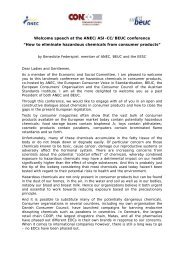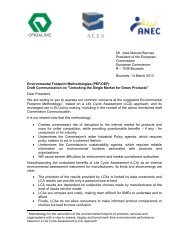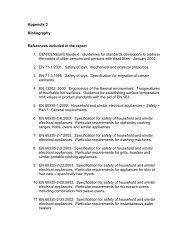Services Standards: Defining the Core Consumer Elements ... - ANEC
Services Standards: Defining the Core Consumer Elements ... - ANEC
Services Standards: Defining the Core Consumer Elements ... - ANEC
You also want an ePaper? Increase the reach of your titles
YUMPU automatically turns print PDFs into web optimized ePapers that Google loves.
Hans-W. Micklitz<br />
6. Monitoring and inspection<br />
In <strong>the</strong> here chosen perspective, <strong>the</strong> service provider must be regarded as <strong>the</strong><br />
addressee of <strong>the</strong> monitoring and inspection duty. That is why monitoring and<br />
inspection duties imposed on <strong>the</strong> Member States and/or on <strong>the</strong> European<br />
Commission by way of reporting duties might be set aside.<br />
The directives and regulations which define <strong>the</strong> ground rules for <strong>the</strong> vertical<br />
markets do not deal with monitoring and inspection duties. In <strong>the</strong>ory <strong>the</strong><br />
European legislator may define a legal framework for codes and guidelines to<br />
be elaborated by business and/or business organisations. So far, however, <strong>the</strong><br />
European legislator has, if any, obliged Member States to promote <strong>the</strong><br />
elaboration of codes or has invited <strong>the</strong> European Commission and <strong>the</strong> Member<br />
States to foster <strong>the</strong> elaboration of standards under <strong>the</strong> Service Directive.<br />
That is why monitoring and inspection duties could only be found in less<br />
traditional measures where public agencies and/or business organisations<br />
toge<strong>the</strong>r, or business organisations alone, operate in a legislative vacuum. All in<br />
all, however, <strong>the</strong> development seems to be in an early stage. There are only a<br />
few indications in <strong>the</strong> area of network services and <strong>the</strong> services coming under<br />
<strong>the</strong> Service Directive. The “best execution obligations” which could be<br />
transposed into a learning mechanism have not been given shape in <strong>the</strong><br />
Lamfalussy procedure 393 . In this respect <strong>the</strong> European legislator leaves it for all<br />
less traditional regulators to give shape to best execution obligations.<br />
<strong>Consumer</strong><br />
contract law<br />
on services<br />
Transport<br />
Financial<br />
services<br />
Network<br />
services for<br />
customers<br />
(electricity,<br />
gas,<br />
telecommun<br />
ication,<br />
postal<br />
services)<br />
<strong>Services</strong><br />
such as<br />
contracts<br />
with liberal<br />
professions<br />
and<br />
craftsmen<br />
Monitoring<br />
and<br />
inspection in<br />
binding law<br />
Best<br />
execution<br />
obligations 394<br />
Postal<br />
services -<br />
Member<br />
States shall<br />
publish<br />
information<br />
on <strong>the</strong><br />
number of<br />
complaints<br />
Assessment<br />
by<br />
independent<br />
bodies,<br />
Assessing<br />
<strong>the</strong><br />
competence<br />
of a provider,<br />
393 See fn. 11.<br />
394 Directive 2004/39/EC recital 44.<br />
124
















